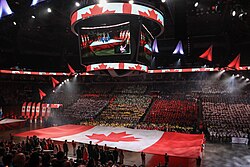| Canada Games Jeux du Canada | |
|---|---|
 | |
 Opening ceremonies 2017 Canada Summer Games | |
| Status | Active |
| Genre | Multi-sport event |
| Frequency | Biannual |
| Location | Various |
| Country | Canada |
| Inaugurated | Winter Games 1967 Summer Games 1969 |
| Organised by | Canada Games Council |
| Website | canadagames |
The Canada Games (French : Jeux du Canada) is a multi-sport event held every two years, alternating between the Canada Winter Games and the Canada Summer Games. They represent the highest level of national competition for Canadian athletes. Two separate programs are organized in order to cover the seasons of summer and winter: the Canada Summer Games (CSG) and the Canada Winter Games (CWG). Athlete age eligibility rules vary.
Contents
- History
- Facility development
- Sports
- Former sports
- Returning sports
- Organization
- Host Society
- Funding
- Hosts
- Summer
- Winter
- Host provinces/territories
- Map of host cities
- All-time medal tables
- Medal leaders by year
- See also
- References
- External links
The first Canada Winter Games was the 1967 Canada Winter Games, marking the beginning of this important sporting event for Canadians. It has since become integral to celebrating Canadian talent for young amateur Canadian athletes focused on winter sports. The most recent Canada Winter Games was the 2023 Canada Winter Games which ran from February 18 – March 5, 2023 in the province of Prince Edward Island. [1] [2] The next Canada Winter Games, the 2027 Canada Winter Games, will be hosted in Quebec City, Quebec. The dates are yet to be announced.
The first Canada Summer Games was the 1969 Canada Summer Games. The most recent Canada Summer Games was the 2025 Canada Summer Games which took place August 9–24, 2025 in St. John's, Newfoundland and Labrador. [3] The next Canada Summer Games, the 2029 Canada Summer Games, will be hosted in Moncton and Saint John, New Brunswick.

